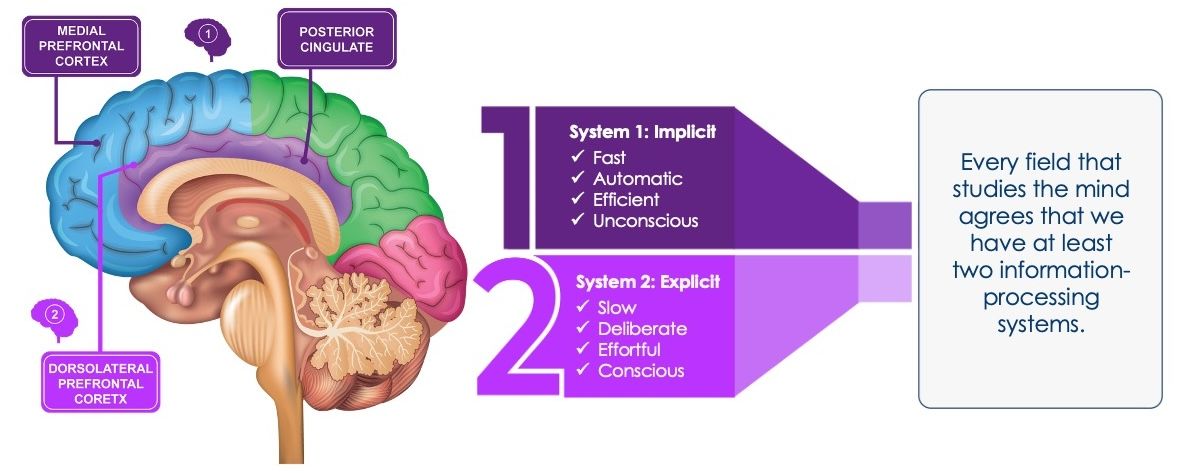Almost everything you are doing right now, and not doing, is controlled by a part of your brain you do not control and rarely notice.
Consider: What are you paying attention to right now? What are you ignoring? You are bombarded with bits of information - how was the decision made to ignore almost all of it?
"Hmm, what should I pay attention to... maybe I should scan the walls... OK, no...".
A part of your mind working in the background decided for you and guided your conscious mind to ignore almost everything around you.
There are a lot of complex pulleys and levers involved in deciding what is important enough to absorb our precisions resources, what we should bother to notice, what we should ignore. It just all happens outside our awareness and control.
OK, now imagine an apple.
Most of you immediately, had a visual image of an apple. Shape, size, color. You knew what would happen if you cut it open. You might have had a feeling about it - if you are hungry.
Did you consciously think about that - put effort into getting that information?
"Hmm... what is apple? What does an apple look like... let me think..."
What instantaneously threw all that information about an apple into your conscious mind? Where did it get the information?
Imagine a police officer.
Imagine a world leader.
If you are like most people, images or feelings came to mind very rapidly as you imagined those people.
Imagine a drug addict.
Lots of information, no effort, no conscious control. One thing that is certain - if there is any threat associated with any of those things, your unconscious mind guided you to pay attention to information about the threat.
Imagine a large unknown dog walking toward you.
Imagine a bunny rabbit in your yard.
So, what does this mean for unintended biases?
Every scientific field that studies the mind agrees that our we have two distinct thinking systems, each with its own characteristics, functions, and modes of operation.
Consider: What are you paying attention to right now? What are you ignoring? You are bombarded with bits of information - how was the decision made to ignore almost all of it?
"Hmm, what should I pay attention to... maybe I should scan the walls... OK, no...".
A part of your mind working in the background decided for you and guided your conscious mind to ignore almost everything around you.
There are a lot of complex pulleys and levers involved in deciding what is important enough to absorb our precisions resources, what we should bother to notice, what we should ignore. It just all happens outside our awareness and control.
OK, now imagine an apple.
Most of you immediately, had a visual image of an apple. Shape, size, color. You knew what would happen if you cut it open. You might have had a feeling about it - if you are hungry.
Did you consciously think about that - put effort into getting that information?
"Hmm... what is apple? What does an apple look like... let me think..."
What instantaneously threw all that information about an apple into your conscious mind? Where did it get the information?
Imagine a police officer.
Imagine a world leader.
If you are like most people, images or feelings came to mind very rapidly as you imagined those people.
Imagine a drug addict.
Lots of information, no effort, no conscious control. One thing that is certain - if there is any threat associated with any of those things, your unconscious mind guided you to pay attention to information about the threat.
Imagine a large unknown dog walking toward you.
Imagine a bunny rabbit in your yard.
So, what does this mean for unintended biases?
Every scientific field that studies the mind agrees that our we have two distinct thinking systems, each with its own characteristics, functions, and modes of operation.
These two systems are often referred to as System 1 ( Implicit, Fast, Effortless, Unconscious Thinking System) and System 2 (Explicit, Slow, Effortful, Conscious Thinking System).
For the rest of this post we will refer to System 1 (Implicit, Fast, Effortless, Automatic) as the Unconscious Thinking System and System 2 (Explicit, Slow, Effortful, Deliberate) as the Conscious Thinking System.
For the rest of this post we will refer to System 1 (Implicit, Fast, Effortless, Automatic) as the Unconscious Thinking System and System 2 (Explicit, Slow, Effortful, Deliberate) as the Conscious Thinking System.
The Unconscious Thinking System automatically guides The Conscious System. The Unconscious Thinking System is very fast, responding within the first few hundreds of milliseconds. The Conscious Thinking System is comparatively slower, forming conscious thoughts and impressions well after the Unconscious Thinking System has responded.
Our Unconscious Thinking System enables us to navigate most things and situations in our world very rapidly. It is extremely adaptive. We would be paralyzed without it.
As we covered, right now, most of what you're doing and not doing is controlled in the background by your Unconscious Thinking System. For example, you are currently bombarded by millions, if not billions, of bits of information. Your Slow (Conscious) Thinking System is not paying attention to the vast majority of information going out your because your Unconscious Thinking System rapidly categorized it as irrelevant (not useful, novel or dangerous). We take this for granted. Consider this - if your Unconscious Thinking System had not guided your Slow Thinking System, you would be constantly scanning the room you are in for threats or anything the would require a response.
As we covered, right now, most of what you're doing and not doing is controlled in the background by your Unconscious Thinking System. For example, you are currently bombarded by millions, if not billions, of bits of information. Your Slow (Conscious) Thinking System is not paying attention to the vast majority of information going out your because your Unconscious Thinking System rapidly categorized it as irrelevant (not useful, novel or dangerous). We take this for granted. Consider this - if your Unconscious Thinking System had not guided your Slow Thinking System, you would be constantly scanning the room you are in for threats or anything the would require a response.
One more example. Maybe you have had this experience - I know I have. You are driving home from work, and as you pull out, you decide to make a stop along the way. You start thinking about something else, and the next thing you know, you are in front of the place you live. You have very little memory of the drive. In this case your Unconscious Thinking System used stored associations through repeated experience to guide your behavior. It didn't drive you out off the edge of a road or to a random destination; it drove you home. It took over because your Conscious Thinking System was otherwise occupied or distracted.
The Unconscious Thinking System learns through associations. It is not moral or immoral.
The Unconscious Thinking System learns through associations. It is not moral or immoral.

